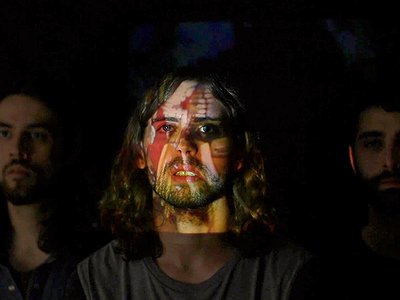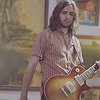Name: Thompson Springs
Interviewees: Matt Smith, Jacob Bicknase
Nationality: American
Occupation: Songwriters
Recommendations: Ryley Walker - Primrose Green. Fusing jazz and acoustic folk jams, songs experience huge dynamic shifts.
Larry Brown - On Fire. Collection of short stories detailing his time as a firefighter in rural Mississippi. Serious and tragic events are weighed with trivial activities and daily thoughts.
Website / Contact: If you enjoyed this interview with Thompson Springs, find out more about them and their music on Facebook, bandcamp or their personal website.
When did you start writing/producing music - and what or who were your early passions and influences? What what is about music and/or sound that drew you to it?
Matt Smith: Writing started later. Listening and collecting were first. Around age 12 I started listening to old blues and blues based bands. It was hard to find others at that age with similar tastes, so it became a personal hobby, a quiet place to dig into. With the blues stuff, it was the rawness and the and haunting overtones. I think listening to music has the ability to change your mood on a dime, and that’s my favorite part about it.
For most artists, originality is first preceded by a phase of learning and, often, emulating others. What was this like for you? How would you describe your own development as an artist and the transition towards your own voice? What is the the relationship between copying, learning and your own creativity?
Jacob Bicknase: I think the process of learning from and emulating others doesn't end when you find your own voice. It's a process that continues to shape the way you express yourself and the tools you use to do so. I think it's smart to really pick a few artists that you really admire and dig deep with them - learn their licks or riffs, but also go further to try and find the method they use to create those licks.
Matt: I was emulating for years. I would just play to records. Live songs, 15 minute jams. The more you play, the more the music slows down, and you can figure out what is going on. I don’t think there are any shortcuts. You have to play along for hours. I can tell the people who haven’t. Emulating has made me proficient on guitar, but I do think it has made the road to original creativity a bit harder. I have to fight uphill to make sure I’m not emulating, but creating new ideas. I’m conscious of it constantly, and often fail. Sometimes the most original ideas are when you have no idea what you are doing or zero proficiency on an instrument.
What were your main compositional- and production-challenges in the beginning and how have they changed over time?
Matt: Biggest compositional challenges are original structures, melody, and harmony. Funny because those are the main parts of songs. I don’t have a natural sense of melody, so I have to work extra hard at that, and I often ask Jake to help me with them. I think my words are okay and honest. I like the tones I’ve been getting with the guitar lately. Production wise, I started with nothing, but have recently been able to do add simple overdubs and do simple mixes after accumulating some basic gear. It’s been a fulfilling experience to learn slowly. I still rely heavily on studios, and my friend Rob Laakso who mixes most of my work with Thompson Springs.
What was your first studio like? How and for what reasons has your set-up evolved over the years and what are currently some of the most important pieces of gear for you?
Matt: First garageband, then Pro tools with an Alesis interface. A few mics, Shure 57’s, condensers. I only use my “home studio” for simple overdubs and demos. I think the most important pieces of gear are the things you record with and how you use them, not the recording gear. At least for creativity. Like lately for me, pedals, and guitars and how you tune them, and how you play them in wild ways.
How do you make use of technology? In terms of the feedback mechanism between technology and creativity, what do humans excel at, what do machines excel at?
Matt: I use technology to enhance songs. There are many people that use technology to make the songs, but that doesn’t work for me. I make the songs on an instrument or in my head, and then use technology and machines to enhance it. I recently played a slide guitar part with a fuzz pedal, and then reversed it. To me, it’s the coolest part of the song. But I wouldn’t have got to that point without the song itself first.
Production tools, from instruments to complex software environments, contribute to the compositional process. How does this manifest itself in your work? Can you describe the co-authorship between yourself and your tools?
See above. The writing and recording process are such different things to me. Whole different mentalities. I would say the songwriting part is solely an authorship with my self or the person I am writing with, while the recording part is almost like a collaboration with the studio, technology, and machines that are used in the song.
Collaborations can take on many forms. What role do they play in your approach and what are your preferred ways of engaging with other creatives through, for example, file sharing, jamming or just talking about ideas?
I’m not very good at collaborating in the songwriting stage, especially with lyrics. I don’t understand how you can work with someone on lyrics that are personal. I feel like when you work on lyrics with someone else, you are trying to make them accessible or more commercial, which immediately takes away from the honesty that they should have. When I have the basics of a song, I usually share it with my bandmate Jake Bicknase. He’s my sounding board, and if he’s into it, I feel like I can move it forward. When it gets to the recording stage, I’m more open for people to contribute, and Jake and my frequent bass player Andy Goitia have a lot of free rein and have come up with some great parts. I had a lot of guests on my last EP, and I really value being almost like a facilitator to others ideas.



